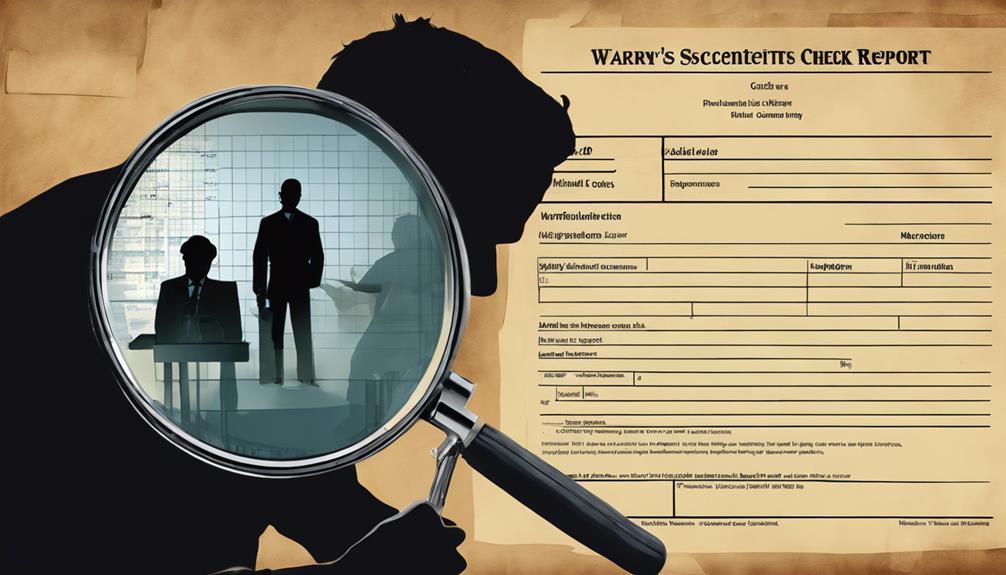Warrants have the potential to show up on background checks, affecting employment opportunities and legal standing. Depending on the type and area, warrants like arrest or bench warrants may be visible. It's important for individuals to understand the impact warrants can have on their background checks and overall situation.
Key Takeaways
- Arrest warrants commonly appear in background checks.
- Bench warrants may also show up depending on the check type.
- Fugitive warrants are more likely in detailed checks.
- Civil and traffic warrants have varying visibility.
- Employers must follow legal procedures when handling warrants.
Understanding Types of Warrants

When conducting background checks, understanding the different types of warrants is essential to assess any potential legal issues that may arise. These warrants can include arrest warrants, bench warrants, civil warrants, traffic warrants, and search warrants.
Bench warrants are often visible on standard background checks and are issued during ongoing cases for various reasons. Civil warrants, such as those related to Failure to Appear in court or not following court orders like failing to pay child support, may appear in court records but mightn't show up on standard criminal background checks.
Traffic warrants, which are often considered bench warrants, are issued for unpaid traffic tickets and may or may not be included in background checks, depending on the type of check conducted. Search warrants, primarily used in criminal investigations with probable cause, are typically not part of public records and hence don't usually appear on standard background checks conducted by employers or for other purposes.
Impact of Warrants on Background Checks
The presence of warrants on background checks can greatly influence hiring decisions and individual opportunities. When conducting background checks, arrest warrants and bench warrants are more likely to appear compared to civil or traffic warrants.
The visibility of warrants on these checks can vary depending on the type of check being carried out. For certain job positions, especially those in law enforcement or requiring security clearance, a thorough background check revealing warrants may be mandatory.
Warrants, such as fugitive warrants issued for criminal suspects across states, are more likely to show up on these detailed background checks. Employers must follow specific legal procedures if a warrant appears on a background check, ensuring fair consideration before making any employment decisions.
Understanding the impact of warrants on background checks is essential for both employers and individuals seeking employment opportunities.
Employer Considerations for Warrants

Employers need to carefully assess the presence of warrants on background checks when making hiring decisions. Different job positions may require detailed background checks that could uncover warrants, especially for roles requiring security clearance. Understanding geographic restrictions and state laws is essential as these factors can affect the visibility of warrants on background checks and subsequent hiring decisions.
Fugitive warrants, in particular, may emerge during thorough background checks for specific job roles, prompting employers to review the nature of the warrant in relation to the job requirements. When faced with warrants on background checks, employers must follow specific procedures and conduct a thorough evaluation of the applicant's suitability for the position.
Handling Applicants With Warrants
Applicants with warrants on their background checks should be carefully evaluated before making hiring decisions. When handling applicants with warrants, employers should consider the following:
- Request an Explanation: Ask the applicant to elucidate the circumstances surrounding any warrants that appear on their criminal background check.
- Understand the Types of Warrants: Differentiate between bench warrants issued for failing to appear in court and arrest warrants related to criminal activities.
- Consider Job Requirements: Evaluate whether the warrants found may impact the job role, especially for positions requiring security clearances.
- Navigate Geographic Restrictions: Be cognizant that the visibility of warrants on background checks can vary based on geographic locations and state laws.
Employers must follow specific background check procedures when warrants surface to guarantee informed hiring decisions are made while respecting the rights and privacy of the job applicants.
Legal Framework on Warrants

Understanding the legal implications of warrants that may appear on background checks is vital for ensuring informed hiring decisions and respecting the rights of individuals. Warrants are issued by a court and come in various forms, including arrest warrants, bench warrants, civil warrants, and traffic warrants. Employers conducting background checks may come across these warrants, depending on the type of check performed and the nature of the job.
It's essential for individuals to be aware of the legal framework surrounding warrants and seek legal advice if needed. Resolving warrants promptly is necessary to address any potential issues that could arise during background checks. By having a clear understanding of the legal implications of warrants and seeking appropriate guidance, individuals can navigate the process effectively and address any concerns that may arise when their background checks are being reviewed by potential employers.
Types of Warrants and Resolving Them
Different types of warrants, such as arrest, bench, civil, and traffic warrants, can impact background checks for employment. Understanding the visibility of warrants and the steps to resolve them is vital in addressing any potential issues.
Resolving warrants involves verifying their existence, consulting with a legal professional, and taking necessary steps to address the underlying legal matters.
Warrant Visibility on Checks
Various types of warrants, including arrest warrants, bench warrants, and civil warrants, may appear on different types of background checks. When considering warrant visibility on checks, it's important to understand the nuances of each type and how they can impact an individual's record.
Here are key points to remember:
- Not all warrants are created equal: Different warrants, such as traffic warrants and search warrants, may not always show up on standard criminal background checks.
- Bench warrants and criminal records: When a bench warrant is issued, it can reflect on a person's criminal record and potentially lead to legal consequences.
- Proactive monitoring is essential: Regularly checking public court records and seeking assistance from law enforcement agencies can help individuals stay informed about any warrants against them.
- Legal counsel is valuable: Consulting with a criminal defense attorney is important for understanding warrant implications, resolving legal issues, and moving towards a resolution.
Resolving Outstanding Warrants
Resolving outstanding warrants involves confirming their presence, consulting with a criminal defense attorney, and taking necessary steps towards resolution. Different types of warrants, including arrest warrants, bench warrants, civil warrants, and traffic warrants, may require specific actions for resolution. Failure to appear in court can result in bench warrants, while arrest warrants are issued for suspected criminal activity. Civil warrants are related to non-criminal disputes, and traffic warrants stem from violations like unpaid tickets.
Consulting with a criminal defense attorney is essential in understanding the charges, legal implications, and potential consequences. Resolving warrants often entails complying with court orders, possibly turning oneself in, and following legal procedures for closure. Verification of resolution involves obtaining official documentation, monitoring legal records periodically for accuracy, and addressing any discrepancies promptly.
Seeking guidance from a qualified attorney throughout the process ensures proper resolution and can help prevent future legal complications.
Importance of Addressing Warrants

Addressing warrants promptly is essential for individuals to mitigate potential repercussions on their daily lives and future prospects. Failing to resolve outstanding warrants can lead to various consequences, such as arrest, legal issues, and limitations in obtaining licenses.
Here are four reasons highlighting the importance of addressing warrants promptly:
- Legal Consequences: Failure to appear in court can result in warrants being issued against individuals, leading to potential legal trouble.
- Background Check Impact: Warrants might show up on certain types of background checks, influencing job opportunities and housing options.
- Arrest Risk: Open warrants can lead to arrest if encountered during routine checks or interactions with law enforcement.
- Peace of Mind: Resolving warrants promptly can prevent further complications, offering individuals peace of mind and a clean legal record.
Seeking legal assistance can help individuals navigate the process efficiently and effectively, ensuring a smoother resolution of outstanding warrants.
Frequently Asked Questions
How Long Does a Warrant Stay Active in Texas?
In Texas, a warrant can stay active indefinitely until resolved by the individual. Some warrants may have specific expiration dates. Resolving warrants promptly is essential to avoid legal consequences. Seeking legal assistance can help.
How Long Do Warrants Last in Michigan?
In Michigan, warrants linger like shadows in the night, with no set expiration date. Arrest warrants haunt for years, while bench warrants await resolution in court. Addressing the legal matter promptly is key to clearing one's record.
How Long Do Warrants Last in Illinois?
In Illinois, warrants can last indefinitely until resolved through legal action. Bench warrants remain active until the individual appears in court, arrest warrants stay on record until apprehension, and Capias Pro Fine warrants persist until fines are paid.
How Long Do Warrants Last in Indiana?
Warrants in Indiana can last indefinitely until resolved. Bench warrants remain active until court appearance. Arrest warrants may be outstanding for years if not addressed. Some warrants have court-set expiration dates. Failure to address warrants promptly leads to legal consequences.
What Kind of Warrants Can Show Up on a Background Check?
When conducting a background check, various types of warrants may appear, including arrest warrants in background checks. These warrants can stem from unpaid fines, missed court appearances, or criminal charges. It’s important to be aware of what warrants may show up on a background check to address any potential issues.
Conclusion
To sum up, warrants can indeed appear on background checks, potentially impacting an individual's employment prospects.
Surprisingly, a report by the National Employment Law Project found that over 73 million Americans have some form of criminal record, underscoring the widespread nature of this issue in the workforce.
Employers must carefully consider how to handle applicants with warrants while staying within the legal framework to guarantee fair treatment for all candidates.









